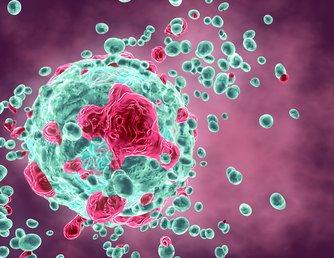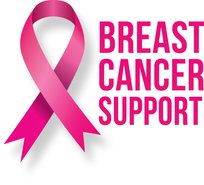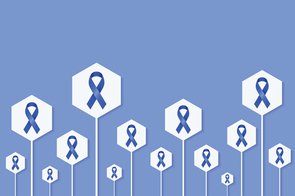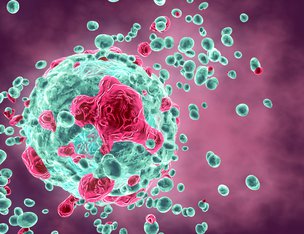With approximately 990 people being diagnosed with cancer every day, cancer is something that we all need to be aware of.

Cancer is the term given to a collection of related diseases and occurs when some of the body's old, damaged cells begin to divide continuously and spread to surrounding tissues. This can cause a lump to form, which is often referred to as a tumour & can be either cancerous (malignant) or non-cancerous (benign).
There are over 200 types of cancer, but you can view information about the 5 most common cancers experienced by people in the UK below.
5 Most Common Types of Cancer
According to data published by the Office of National Statistics, "The five most common cancers for males and females make up the majority of all cancers diagnosed in males (60.5%) and females (63.3%)." Therefore, it is important that we are all aware of what these 5 types of cancers are and what we can do to reduce our risk of developing them.
1. Breast Cancer
5 Facts

- 1 in 7 females will be diagnosed with breast cancer in their lifetime
- 23% of breast cancer cases in the UK are preventable
- Most women diagnosed with breast cancer are over the age of 50
- In rare cases, men can also be diagnosed with breast cancer
- There are several types of breast cancer (inc. non-invasive, invasive, invasive lobular, inflammatory)
What are the symptoms of breast cancer?
- Breast - A lump, area of thickened tissue, change in shape, dimpling of the skin
- Nipple - Discharge which may contain blood, a rash, change in appearance
- Armpit - A lump or swelling
** Please note that pain is not a usual symptom **
How is breast cancer treated?
- Surgery
- Chemotherapy
- Radiotherapy
What contributes towards the risk of breast cancer?
Uncontrollable factors:
- Ageing
- A previous benign breast lump
- History of breast cancer in your family
- You have been diagnosed before
Controllable factors:
| Preventable Cause (UK) | Percentage of cases (%) |
|---|---|
| Oral contraceptive | Below 1% |
| Post-menopausal hormones | 2% |
| Not breastfeeding | 5% |
| Alcohol | 8% |
| Overweight/obesity | 8% |
2. Prostate Cancer

5 Facts
- Prostate cancer is the most common cancer in men in the UK
- There are around 47, 700 new prostate cancer cases in the UK every year
- More than 8 in 10 men diagnosed with prostate cancer in England and Wales survive for 5 or more years
- 1 in 6 UK males will be diagnosed with prostate cancer in their lifetime
- Prostate cancer is not directly linked to any preventable risk factors
What are the symptoms of prostate cancer?
- An increased need to urinate
- Straining when urinating
- The feeling that your bladder is not completely empty
How is prostate cancer treated?
Treatment for prostate cancer is not always necessary immediately if the cancer is still in its early stages and isn't causing many, if any, symptoms. When the time does come for treatment to be actioned, the following may be performed:
- Surgery to remove the prostate
- Radiotherapy
- Hormone therapy
3. Lung Cancer

5 Facts
- Approximately 47,000 people are diagnosed with lung cancer in the UK each year
- More than 4 in 10 people diagnosed with lung cancer in the UK are 75 or older
- Smoking is the most common cause accounting for around 72% of cases.
What are the symptoms of lung cancer?
- A persistent cough, maybe even coughing up blood
- Constant breathlessness
- Unexplained weight loss or fatigue
- Pain when coughing or breathing
How is lung cancer treated?
- Surgery
- Radiotherapy
- Chemotherapy
- Immunotherapy
What contributes towards the risk of lung cancer?
Uncontrollable factors
- Having a family history of lung cancer
Controllable factors
- As mentioned previously, smoking is the main cause of lung cancer and is totally preventable. The risk of a person will increase with the number of cigarettes smoked in a day. No matter how long you have smoked, quitting will significantly reduce a persons' risk of lung cancer. Even if someone is not a smoker themselves, if they are exposed to secondhand smoke they are also at risk.
- Exposure to radon gas which is produced by the natural breakdown of uranium in soil, rock and water
- Exposure to asbestos or any other carcinogen can increase the risk of lung cancer
4. Colon & Rectal Cancer (Bowel Cancer)

5 Facts
- Bowel cancer accounts for 12% of all new cancer cases in the UK
- Bowel cancer is most common in people who are aged 85-89
- 6 in 10 people diagnosed with bowel cancer in England and Wales survive for 10 or more years
- 1 in 15 males and 1 in 18 females in the UK will be diagnosed with bowel cancer in their lifetime
- Mortality rates are higher in people who are aged over 90
What are the symptoms of bowel cancer?
- Persistent blood in stools
- A change in bowel habits
- Constant lower abdominal pain, bloating or discomfort
How is bowel cancer treated?
- Surgery
- Chemotherapy
- Radiotherapy
- Biological treatments
What contributes towards the risk of bowel cancer?
Uncontrollable factors
- Ageing
- Having previously had breast, ovary or uterine cancer
- A family history of bowel cancer
- Having a preexisting condition including Crohn's disease, irritable bowel syndrome or ulcerative colitis
- The presence of polyps in the colon or the rectum
Controllable factors
| Preventable Cause (UK) | Percentage of cases (%) |
|---|---|
| Not consuming enough fibre | 28% |
| Eating processed meat | 13% |
| Being overweight or obese | 11% |
| Smoking | 7% |
| Alcohol | 6% |
| Not enough exercise | 5% |
| Ionising radiation | 2% |
5. Melanoma of Skin Cancer

5 Facts
- There are approximately 16,000 new cases of melanoma skin cancer cases in the UK each year.
- Melanoma skin cancer accounts for 5% of the UK's new cancer cases
- Skin cancer is most often identified in people aged between 85 - 89
- Most melanoma cancer occurs in the trunk or the legs
- 86% of melanoma skin cancer cases in the UK are preventable
What are the symptoms of melanoma skin cancer?
- A new or existing mole that is an irregular shape/has changed shape, and is more than one colour.
- A mole which is itchy and bleeds
How is skin cancer treated?
- Surgery
- Radiotherapy
- Medication
- Immunotherapy
- Targeted treatments
- Chemotherapy
What contributes towards the risk of skin cancer?
Uncontrollable factors
- Ageing
- A family history of skin cancer
- A persons' skin, hair and eye colour type
- Pre-existing conditions including inflammatory bowel disease, HIV, Crohn's disease & ulcerative colitis
Controllable factors
- Overexposure to ultraviolet radiation (sunburn, sunbathing, sunbeds)
- People who are overweight or obese
- Occupational exposes including airline workers
Can cancer be prevented?

According to Cancer Research UK, "four in ten cancer cases in the UK can be prevented."
Things you can do to reduce your risk of cancer:
- Don't smoke - Smoking is the largest cause of cancer in the UK. 55,000 cases of cancer every year in the UK are caused by smoking and is linked to at least 15 types of cancer.
- Maintain a healthy weight - Rising obesity levels could cause an extra 670,000 cases of cancer by 2035. 23,000 cases of cancer in the UK are caused by obesity annually. At the rate we are going, obesity could even overtake smoking as the largest preventable cause of cancer in women in the next 25 years.
- Be careful in the sun - 86% of skin cancer cases in the UK are preventable. There are around 16,000 new melanoma skin cancer cases in the UK every year.
- Avoid certain substances at work including asbestos - People in the construction profession are at higher risk of getting cancer as a result of exposure to harmful substances. For those affected, it can take anything from 15 - 60 years to develop symptoms.
- Drink less alcohol - Drinking less alcohol could prevent 12,800 cancer cases per year in the UK. Alcohol is know to cause cancers of the mouth, throat, voice box, oesophagus, breast, liver and bowel. The less you drink, the lower your risk of cancer!
- Include high fibre foods in your diet - Around 9 in 10 people in the UK are not meeting the recommended amount of 30g of fibre a day. Eating good high in fibre can reduce a persons' risk of bowel cancer.
- Eat less processed meat - It is recommended that people do not exceed 70g of red & processed meats a day. Reducing red & processed meat intake can reduce the risk of bowel cancer.
- Be active - Up to 1 hour of moderate activity daily or 30 minutes of vigorous activity is recommended to cut your risk of cancer. Being active helps prevent cancer in different ways. For instance, high activity levels may lower the level of oestrogen in the body, helping to prevent breast cancer.
- Minimise HRT use - Evidence demonstrates that hormone imbalance therapy (HRT) can increase the risk of breast, ovarian and endometrial cancers. The risk of cancer is higher for those who have been taking HRT for 5 or more years.
If you suspect that you or someone you know has a form of cancer, please take action and book an appointment with your GP, or encourage them to do so as soon as possible. The earlier cancer is caught, the higher the likelihood of treatment being successful.
Are you in the process of looking for care services close to you? Please get in touch for our support!
Call us on 01865 638018
Send message

